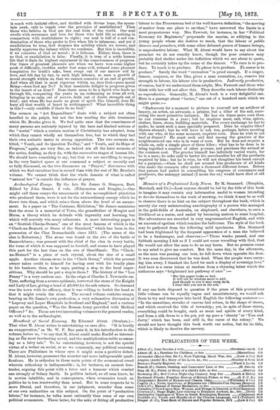Handbook of Social Economy. By Edmund About. (Strahan.)— That what
M. About writes is entertaining va sans dire. "It is hardly an exaggeration," as Mr. W. F. Rae puts it, in his introduction to the volume before us, "to say that M. About could make Euclid as interest- ing as tte most fascinating novel, and the multiplication-table as amus- ing as a fairy tale." To be entertaining, however, is not the special virtue of a writer on social, or as we commonly, say political economy. There are Philistines in whose eyes it might seem a positive defect. M. About, however, possesses the sounder and more indispensable quali- fications. He is orthodox in those main points of the economical creed wherein orthodoxy is indispensable ; is, for instance, an earnest free- trader, arguing this point with a force and a humour which remind one strongly of Sidney Smith. In politics indeed, as all men know, he is nowise infallible, and in consequence, when economics touch on politics he is less trustworthy than usual. But in some respects he is more liberal, and therefore, in our judgment, sounder than some of our own authorities on this subject. On the point of "productive labour," for instance, he talks more rationally than some of our own political economists. These latter, for the sake of fitting all productive
labour to the Procrustean bed of the well-known definition, "the moving' of matter from one place to another," have narrowed the limits in a most preposterous way. Mrs. Fawcett, for instance, in her "Political Economy for Beginners," propounds the maxim, so edifying to the young people whom she desires to teach, that the labour of public dancers and preachers, with some other debased genera of human beings, is unproductive labour. What M. About would have to say about the preacher we do not exactly know, though the poor creature may probably find shelter under the definition which we are about to quote, - but he certainly takes up the cause of the dancer. "To cure is to pro- duce. To teach is to produce. To please is to produce. To amuse is to produce." Surely the word "recreation" is proof enough. If a singer, dancer, conjurer, or the like, gives a man recreation, i.e., renews his strength to labour, his labour also is productive. Indirectly productive, of course, but if we understand them aright, Mrs. Fawcett and those who, think with her will not allow this. They describe such labour distinctly as unproductive. Generally, M. About's book is a very delightful one. Here is a passage about "barter," one out of a hundred such which we might quote :- "Endeavour for a moment to picture to yourself not an artificer of luxury, an artist, an advocate, a printer, but a tiller of the soil, exer- cising the most primitive industry. He has six times more corn than he can consume in a year ; but he requires meat, salt, wine, spices,. clothes, linen, shoes, building materials. For every exchange he has to' make, he must seek a man specially prepared. Does he require tiles? Slaters abound ; but he will have to ask ten, perhaps, before meeting with one who, at the same moment, requires corn. Does he wish to eat beef at dinner ? He must seek and find among the graziers of the neighbourhood one who is in want of corn. But he does not require a whole ox, only a simple piece of three kilos ; what has to be done is to bring together a number of other p3rsons, and purchase the animal at the common cost. The grazier himself has infinitely varied wants, for he is a man; he asks only to barter his merchandise for all the products. required by him; but he is wise, he will not slaughter his beast except for a purpose,—when he shall see around him producers of all kinds who make the common offer under a thousand different forms. Before that person had ended in assembling his congress of consumers and producers, the unhappy animal (I mean the ox) would have died of old age."


































 Previous page
Previous page